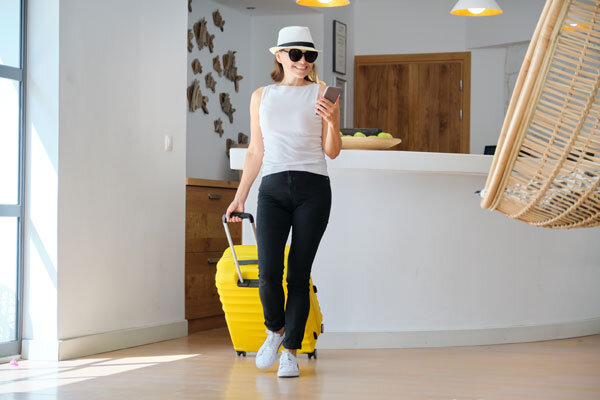From Baby Boomers to Gen Z, today’s travelers want more than a standard room to sleep in—they want a stand-out experience backed by convenience, luxury, and personalized customer service. When shopping for a place to stay, guests seek properties that give them something to connect to emotionally, such as a unique story or the promise of a memorable travel experience.
To create and sell the stay experience, accommodation providers need more than just a pretty room. They need to reflect their local destination, the story of their property, and their target demographic. Here’s how:
Upgrade the In-room Experience
Rather than simply offering a bed, bathroom, and TV, the in-room experience must go above and beyond to drive bookings and increase guest satisfaction.
Quality room amenities and decor reinforce the uniqueness of your brand, helping your property stand out and remain memorable to your guests. Some ideas to get you started are:
- Free Wi-Fi
- Complimentary breakfast
- High-quality towels and linens
- Luxury soaps and hair care products
- Local artwork and handcrafted furnishings
- Streaming services and casting devices
- Family-friendly amenities such as activity packs, board games, and playpens
- Pet-friendly rooms and amenities
- Sleep amenities such as pillow menus, aromatherapy oils, herbal tea selections, sleep masks, and weighted blankets
- In-room draft beer dispensers and craft cocktail kits
Modern hotel technology can also help upgrade the in-room experience. Smart room controls allow guests to tailor their in-room environment to their preferences. Powered by IoT (Internet of Things) technology, smart room functionality can be controlled via mobile app or voice-activated digital assistants like Alexa for Hospitality. Guests can close the drapes, turn on the lights, adjust the room temperature, select entertainment programming, order room service, and even turn on the coffee machine using their smartphone or simply by voice command. This luxurious convenience will appeal to modern travelers looking for a stand-out experience.
Integrated guest messaging solutions give guests an easy way to make requests from their room (or anywhere on property), and allow staff to manage and respond to requests more efficiently, increasing guest satisfaction and positive reviews. Some guest messaging platforms like Operto, Duve, and Akia enable hotels to create digital guides to present house/room manuals, property amenities and services, local recommendations, and more to help guests fully experience the property and surrounding area. They work much like a digital concierge to provide a next-level, personalized guest experience—all while driving efficiency.

Offer Experiential Amenities and Activities
For most, the word “amenities” brings to mind conveniences like free Wi-Fi, in-room coffee and tea bars, and smart room controls. Experiential amenities go beyond modern luxuries and emphasize your property’s unique vibe.
To appeal to consumers’ desire for authentic and memorable travel experiences, hoteliers should consider their property’s connection with the local area and provide amenities and activities rooted in this connection. For example, a beachfront hotel can offer branded sunhats, towels, and flip-flops and organize activities like beach volleyball tournaments for their beachgoing guests. Properties with scenic, natural surroundings can offer bikes, kayaks, paddle boards, and guided hikes for guests to explore the area. A hotel located in a famous art destination can offer painting nights, studio tours, and display the works of local artists on its walls. Properties surrounded by vineyards can include a complimentary bottle of local wine, maps pinpointing wineries, and wine tastings and tours.
Experiential amenities and activities not only enhance the stay experience by encouraging guests to enjoy your destination to the fullest—they help set your property apart from the competition too. Unique amenities inspire guests to share photos on social media, and this free advertising for your property helps attract new business and create repeat and loyal guests.
Tell Your Property’s Story
When picking a place to stay, travelers have endless options to scroll through online, so hoteliers must grab their audience’s attention and hold it long enough to generate a booking. As consumers, we don’t always buy based on price; our purchasing decisions are often driven by emotion and based on the perceived value of the experience. Therefore, it’s important to present an online image (on both your website and social media channels) that immerses potential guests in the stay experience and encourages them to daydream about being at your property.
To tell a great story online and attract bookings, identify your USPs (Unique Selling Points) by understanding why your guests choose you. Describe your stay experience (not just features) and focus on the senses (sights, scents, sounds, taste, and touch) to bring your audience as close to the in-person guest experience as possible.
A hotel website with responsive design, consistent branding, a mobile-friendly online booking engine, stand-out images and videos, and effective calls to action is especially effective at conveying your stay experience and converting lookers into bookers.

Seamless Check-ins
Check-in should be a brief blip in your guest’s day, yet it can make or break their stay experience.
Checking in is often a guest’s first in-person encounter with your property. Guests are usually eager to start their stay and may be stressed out and exhausted from traveling. Providing a quick, easy check-in sets the scene for the entire stay experience. Consider offering self check-in to allow guests to bypass the front desk. Automated pre-arrival emails or text messages invite guests to complete registration online. Information that is traditionally gathered by front desk staff (photo ID, vehicle information, the guest’s signature, and payment) is completed by the guest before arrival. Upon arrival, guests simply collect their room keys and head straight to their room. Or use a mobile key solution to allow guests to skip the front desk entirely!
Hotel Technology and The Human Touch
Most guests want self-service options when traveling because it’s faster and more convenient. For example, self-check-in/check-out saves both guests and hotel staff a lot of time and energy! This decreased need for a traditional front desk means that staff and guests have more time and energy to focus on the stay experience. From warmly acknowledging a guest by name to providing a complimentary bottle of wine for a couple celebrating their anniversary, simple gestures can make the difference between a standard stay and a memorable one—and technology makes it possible.
Technology doesn’t replace but rather enhances the human touch by empowering hoteliers to personalize every guest’s experience. Collecting and processing guest and reservation data, hotel management software helps you understand your guests and meet their needs more efficiently and effectively. A property management system like WebRezPro automatically creates guest profiles from reservation data. Staff can also manually add information to profiles to help them tailor highly personalized, proactive service.
Guest profiles not only help staff remember individual guest preferences and needs. On an aggregate level, guest data helps you get to know your target segments and make informed decisions about the types of packages, amenities, and services you offer to drive more revenue.
When data is automated, guest communications can be personalized and triggered effortlessly, strengthening the guest relationship. Integrating your property management system with your other hotel tech solutions (such as point-of-sale systems, guest engagement apps, and smart room systems) streamlines operational tasks and processes, which in turn creates a more seamless guest experience (with fewer operational hiccups).
More than just a room to sleep in, successful lodging operators provide a highly personalized, immersive stay experience that reflects a combination of their location, property, and guests. Shifting focus toward that experience helps a property stand out from the crowd to win bookings and loyal guests.
Editor’s Note: This post was last updated June 2024.

